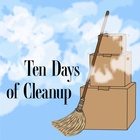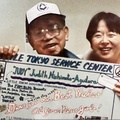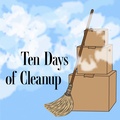I only had seven days to get rid of everything in my client’s storage locker. So far, I had disposed of—no, preserved—some historic family photographs from World War II as well as given away vintage car parts to life-long friends who like to restore old vehicles. Next were dark green trash bags filled with I don’t know what.
Sycamore was out of Zoom school early and accompanied me to the locker. She had already grown so much that spring of the pandemic. I was glad that her teacher and classmates couldn’t see that her pants were much too short for her thin legs. I mail-ordered some leggings from Costco to buy some time before we could freely go into a mall and go shopping.
As we pulled the dust-covered trash bags out of the locker, Sycamore accidentally dropped a bag onto the concrete. The sound of glass breaking was followed by an intense smell of a fragrance that almost caused my throat to close.
“Oh, sorry,” Sycamore stood frozen, a blue surgical mask over her mouth and nose and clear plastic gloves on her hands.
I quickly lifted the bag to make sure that it didn’t drip any liquid onto the premises. Luckily, no holes. I opened the bag to reveal about six 16-ounce bottles of a perfume. The name, “Charlie,” was written in script on each bottle. One of the bottles had broken but five were intact.
I seemed to remember that same perfume in the medicine cabinet in my host family’s bathroom. I had been in high school in Fresno, California.
Back then, the scent seemed too fruity and overpowering. I found it no different today. I wanted to throw the whole bag into the storage facility’s Dumpster, but it was locked to prevent anyone from doing so. I put the Charlie’s bottle bag in another trash bag and secured the top to prevent leakage. We had no choice but to take the perfume bottles with us and dump it in some random Dumpster on our way home.
There were ten bags of perfume bottles. Most were empty or only contained a line of fragrance.
I hated exposing my daughter to covert Dumpster use, but what could I do? As it turned out, however, so many stores and apartment buildings had locked their Dumpsters. I finally stopped at a senior facility whose Dumpster seemed recently emptied.
I began pulling out the bags when Sycamore yelped from the open window. “Mom, don’t do it!”
I surveyed my surroundings. Had a police car passed by?
Sycamore jumped out of the truck with her iPad. “See how much they are each worth.”
Her iPad screen displayed a page on eBay. There was a 16-ounce bottle of Charlie circa 1970. I had to blink hard a couple of times to make sure that I had read the number correctly—$295.
Americans always managed to surprised me. While the Japanese wouldn’t hesitate to throw away old treasures like kimono and tansu, an old bottle of perfume was valued at almost $300.
“You know that doesn’t mean someone will actually pay $300 each for these bottles.” I winced as I imagined our tiny cottage being overwhelmed with these trash bags.
Sycamore glared at me. She hadn’t forgiven me for practically giving away the vintage car parts when she later discovered that they were worth maybe hundreds or thousands of dollars.
“Okay, we’ll take them home for now. But we’ll have to find someone to take it by tonight or else I’m going to leave it at the Ralph’s trash bin in the middle of the night.”
I left the bags in the truck bed, almost hoping that someone would steal them and thus solving that day’s problem.
While I was making dinner, Sycamore was bent over her iPad, furiously typing. For a moment I thought that she had abandoned her research for an online game.
“I found someone who will take a look at the perfume bottles,” she finally declared as I placed the plates of mapo dofu on our one table.
“What? Are they coming here now?”
Sycamore nodded. “She’s a writer with the L.A. Times. She’s a perfumista and used to write a perfume column for the newspaper.”
I had never heard the word, perfumista, before. Sycamore had just learned it. Apparently there were these people who were crazy about fragrance; they even collected old perfume and their bottles.
The journalist, who was named Denise, texted me when we had finished washing the dishes.
I’m outside your complex.
I texted back, I’ll be right there.
Before going outside, I put on a fresh mask and adjusted my hair in the mirror. She was a journalist, after all.
Denise turned out to be a tall, thin woman with wispy brown hair that reached her shoulders. Her eyes were dark and alert, as if she was absorbing every part of my body.
“I smell Charlie around here,” she said. She stood about five feet from the bed of the truck that I parked on the street underneath a light. Sycamore was impressed.
I flipped down the tailgate of the truck and one by one, I opened each bag.
“Do you know what you have here—you have a goldmine.”
“I have to get rid of these bags tonight.”
“She’s going to throw it away in a grocery market Dumpster at midnight,” Sycamore cut in. I didn’t even realize that she had followed me outside.
“What? You can’t do that.”
I explained to Denise my predicament. That I was a declutterer by profession, not an eBay reseller. I didn’t have the time, expertise, or space to be selling items over the Internet, especially during a pandemic.
I could tell that various scenarios were going through Denise’s head as I spoke.
“Well, I can take these perfume bottles off of your hands for now. We have a garage that we pretty much have been using for storage. Maybe my son can earn some extra money by putting the perfume and the bottles on eBay.”
“We can’t just give them to you,” Sycamore interrupted.
“Sycamore!”
Denise laughed, apparently amused by Sycamore’s audacity. “No, I wasn’t saying that. Let’s work together. I’ll store and sell them but let’s say, I give 50% of the profit to you.”
“Sixty,” Sycamore insisted.
“Fair enough. We’ll do a sixty-forty split. Although I may want to hang onto a few for my own collection.”
“Fine, fine,” I said. When did my daughter become such a negotiator?
Denise looked through the bags again and pulled out a bottle.
“This one, though, I think that you should keep.” She pulled out a sleek, clear container shaped like a skinny metronome. It was half-filled. She unscrewed the silver cap topped with a ball and revealed a long, aquiline nose from behind her mask. She inhaled quickly as to check its contents and after passing inspection, handed the perfume to my daughter.
Sycamore studied the label on the bottle. “Issey Miyake. I can’t read the rest.”
I took it from her. I didn’t know how to pronounce the other part because it was in French: “L’Eau d’Issey.”
“Dab some on your wrist and tell me what you smell,” Denise said to my daughter.
Sycamore hesitated for a moment. Other than moisturizer, I didn’t wear anything scented. She hadn’t been introduced to perfume yet in her life. I thought to stop her because during the pandemic we were careful not to put anything strange on our skin. But the bags had been covered in dust and had not been tampered with for a while.
Denise noted my unease. “Put a little on your shirt sleeve then.”
Sycamore dabbed some on the sleeve of her long-sleeved shirt and then lowered her mask to take a small sniff. And then another, deeper. She looked up at the illuminated dark sky in contemplation. “Kind of like some kind of melon.”
“Yes,” the perfumista explained. “So clean, right. The name of it means ‘Water of Issey.’ The nose was charged with making the perfume smell like water.”
I became curious and took the bottle from Sycamore to smell it.
“Oh, you have to put it on your clothing or your skin. That’s the true test.”
I was a bit embarrassed that I didn’t know anything about perfume, but Sycamore was so enthralled with this new olfactory discovery that she didn’t seem to notice. “What’s a nose?”
“That’s the perfumer that creates the scent.”
It was getting late so I told Denise that I would follow her to her nearby home to drop off the bags of perfume.
As Sycamore got into the passenger’s seat of the truck, she held her scented shirt sleeve close to her face, enamored with the smell of water.
Note: The perfumista character was inspired by a real-life person, Denise Hamilton, who had written a perfume column for the L.A. Times. To read her columns, go to her website, denisehamilton.com/perfume. Her January 2012 column, “Whiff of Truth,” discusses the role of noses in creating a perfume.
© 2021 Naomi Hirahara





